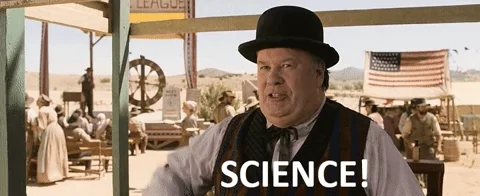Originally published at: Research is suggesting we don't just inherit genes from our parents: "experiences can lead to changes in gene expression" | Boing Boing
…
Epigenetics! This is how trauma can be passed down, for one…
This is not a new concept (and importantly is not Lamarckian inheritance) but is not widely known yet. It is scary that we can pass our trauma and stress to our kids, considering what we are going through right now.
Epigenetic Inheritance of Disease and Disease Risk - PMC (nih.gov)
Wasn’t the background myth of John Merrick that his mother had been trampled by an elephant? I think a lot of sideshow legends included tales of pre-natal horror stories of being terrified by a wild animal.
I’ll bet these guys hate those stories.
I’ve always understood that our DNA changes as we age through the accumulation of duplication errors (for lack of a better word), so it makes sense that certain events could accelerate the process.
Different mechanism, complementary and independent. Epigenetic changes can modify Darwinian evolution, but not actually change them. Methylation of the DNA can be reversed and modified even within the lifetime of an organism. Genetic changes, not so much.
My BFF’s mother is a biologist, and knows some stuff about this, which is how I know what it is… interesting stuff, and it just shows how much we’re still learning about these meat machines we’re all driving around everyday!

This is why I love the BB. Every thread is an opportunity to expand my knowledge by leaps and bounds. I don’t say this enough, but thanks for being here. Your expertise is really priceless.

When I was a wee lad, we were all taught that genes were fixed at conception, and did not change unless you got cancer.
But there’s plenty of reasons to believe that your genes change through your entire lifetime - things as simple as a rhinovirus can cause genetic changes - and we’re still trying to find all the different ways it can happen.
yeah, i’d imagine epigenetics is darwinian. an organism being able to express the same genes differently based on changes in the environment would have more resilient offspring. and that resilience would help create a lasting lineage with that ability
Again, not really. There are viruses that can insert their own genome into the host genome causing a long list of issues, but this does not actually change the genome as such. Stressful events (among other things) can cause epigenetic changes, some of which can alter germline cells and be heritable, but do not change the underlying genetic code. Rather, they alter markers that either promote or inhibit the translation/transcription process. These changes are modifiable, whereas alterations to genetic code via mutation are not. (or at least not easily. Crispr CAS-9 tech is changing that as we speak, so this statement will not hold up for a terribly long time.) None of this is as simple as we were taught in HS. Nor college, and increasingly not in grad school or med school. It is the bleeding edge of rapidly advancing knowledge and will change as I type this. Fascinating stuff, but hard to follow, and very quickly changing.
Yeah, probably should be more precise. I’m using “Darwinian evolution” (which is the mechanism) as shorthand for alteration (deletion, substitution, inversion, etc) in nucleotide sequence (which is the outcome.) And, as I said above, this shit is hard.
Check out Zika.
FTA:
we report that the ZIKV NS5, the viral RNA-dependent RNA polymerase (RdRp) and essential for the viral replication in the cytoplasm, can directly bind with chromatin DNA in the nuclei. In human neural progenitor cells, NS5 inhibits the transcription of numerous neural genes by binding onto their gene body and blocking PAF1C-mediated transcription elongation. The expression of ZIKV NS5 disrupts neurogenesis in developing mouse brain.
This is essentially the same mechanism as methylation/demethylation. The gene is not changed, it is inhibited from being expressed. HIV, HPV and other viruses are capable of inserting their own genome, causing changes into the nucleotide sequence. This is not that.
Hmmm, I see the distinction you are making, OK. So under that definition of change, only the retroviruses are currently known to do it, have I got that right?
(I appreciate the info - it’s been decades since I was involved in any sort of genetic science, although I was totally up to date in the early 90s ![]() )
)
Echoing what others said, I thought it was well known Epigenetics could toggle certain traits on or off.
One paper I remember dealt with rats and how if the mother was in a food scarce environments, her offspring would store fat better than the control group. (Not saying that translates totally to humans, just an example of traits influenced by environment).
Pretty much? But again, this shit is hard, and that’s not entirely accurate either. Things change way fast. I have mentioned elsewhere several years back, I was asked to give a talk on HIV at our local university. Figuring to brush up, I got out my med school textbook. HIV was not in it. ![]() I remember laughing at one of our profs who said that he finished med school before penicillin was available widely. I don’t laugh at that anymore.
I remember laughing at one of our profs who said that he finished med school before penicillin was available widely. I don’t laugh at that anymore.
It was my opinion, back when I was following DNA science closely, that the reason it was hard (back then) was because it was only slowly starting to be treated as an information discipline - the framing was still wet chemistry and biology, so things were made fantastically more difficult to comprehend than necessary. But hopefully nowadays you can talk about error correction in mathematical and logical terms without people shutting down instantly.
I always wondered about the impacts on things like plagues. Take for instance the Columbian Exchange exposure of indigenous peoples to all sorts of diseases. I get that the Ohio River valley had centuries of intermarriage with fur traders that cushioned them, but, surely, not everyone who had any resistance was part-European, and the indigenous folks who survived weren’t just “lucky to have certain genes”, they must have passed on some benefits to their children simply by surviving and their bodies adapting. Classic genetics just feels like it moves too slow.